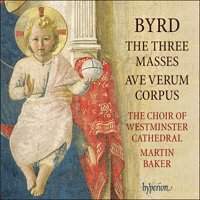Texte paru dans: / Appeared in: |
|
|
|
|
|
Reviewer: J.
F. Weber The coupling of all three Masses by William Byrd is as common on CD as the single versions, and his most familiar motet (heard here) has filled out several of them. While history suggests that recusant Catholics meeting secretly in manor houses would have sung with as little as one voice to a part (and probably sang very softly!), we have heard college and cathedral choirs in these works ever since the first complete set (on two separately issued LPs) by the King’s College Choir, and before that the Masses for four and five voices by the Fleet Street Choir. Since then, St. John’s College choir paired the same Masses, and all three Masses were led by David Hill (at Winchester) and Stephen Darlington (at Christ Church Cathedral), the latter being three separate CDs with a set of Propers from the Gradualia and motets for filler. Several vocal ensembles have paired the Masses for four and five voices (Safford Cape, Jeremy Summerly) or grouped all three Masses: the Deller Consort, the Hilliard Ensemble, Peter Phillips, Mary Jane Newman, Andrew Carwood, and Paul Hiller (with the Pro Arte Singers this time). All of these ensembles were made up of several voices to a part. Note that the three most recent of these were recorded in 1999 and 2000, so a new version is overdue. Until now the Hilliard Ensemble’s marvelously subtle rendering has never been equaled—just hear the close of the four-voice Agnus Dei—though Andrew Carwood’s more recent version comes close. In the category of full choirs, the new version heard here is a welcome addition to the list, for David Hill achieved great things with this very choir but was unable to bring the Winchester choir up to the same level. Martin Baker has maintained the superb level of performance his choir attained under Hill and James O’Donnell, and it shows here. The singing here is unfailingly exquisite, for this is a small choir in which every member counts. When, in the Mass for Five Voices, the boys plead for the Lamb of God to have mercy so urgently as to be irresistible, the result is a hushed, drawn-out “grant us peace” that seems certain of the answer. The morendo is exquisite. The same movement in the Mass for Four Voices, a touchstone of any performance, is restrained yet powerful, reaching the end of “pacem” in much the same way the Hilliards did. The Mass for Three Voices, less popular because ensembles of four or more voices probably find it less rewarding, receives a fine rendition here. It is shorter, more concise than the other two, but here simplicity is a virtue in a performance that treats it as equal to the other two settings. Ave verum corpus is Byrd’s most frequently recorded work, often well done but never better than this. John
Milson’s note ranges wide, comparing the Masses to Byrd’s Anglican music and
to the contemporary continental Masses, situating the music in the delicate
political situation in which Byrd survived. The four days of sessions must
have been extraordinary, for they produced a disc for the ages. This will
stand as Baker’s sterling achievement with the choir. Do not fail to obtain
it for yourself. | |
|
|
|
|
|
|
|
Cliquez l'un ou l'autre
bouton pour découvrir bien d'autres critiques de CD |
|




